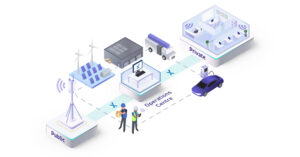Software-defined vehicles are at the forefront of automotive innovation, with initiatives underway to reshape every aspect of the transport experience. The World Economic Forum (WEF) defines four stages for the evolution of software-defined vehicles, with current developments underway emerging at Stage 2 – where vehicle software is updated over-the-air (OTA), building on earlier processes such as emissions reductions, superior safety controls, driver alerts, and managing energy consumption. Following levels focus deeper on green energy, driving autonomy and safety.
Forecasts of a 90% reduction in traffic fatalities, along with significant performance and environmental benefits, is placing software-defined vehicles at the heart of manufacturers and regulators strategies.
The opportunities are vast, from providing superior customer experience with evolutions in safety, navigation, parking assist, and autonomous driving; to monetization opportunities with applications for services such as food, fuel, consumer goods and infotainment.
Standardization will Underpin Success
Consumers are literally putting their lives in the hands of manufacturers and so building reliable vehicles, software and infrastructure is critical. Industry groups, like the WEF community, are focused on defining the multiple technology layers including vehicle sensors, operating software, applications, and data needed to establish a standardised development and deployment model.
Another fundamental component to the successful future of the software-defined vehicle will be vehicle connectivity. Connectivity won’t be a one-size-fits-all approach – smart vehicle connectivity requirements will vary depending on the criticality and function of the applications and transactions. There will be essential transactions related to vehicle performance, increasing as autonomous driving, remote control and digital twinning evolve. Then there are the more discretional transactions which may not fail the vehicle if unsuccessful, but will be key to customer experience – navigation, infotainment, facilitating the location and payment of services. Connectivity will need to be virtually constant to the software-defined vehicle to manage these transactions.

Connectivity Must Be Fit for Purpose
While connectivity will become essential for software-defined vehicles, the actual type of connectivity will depend on several criteria, including transaction priority, speed, sensitivity, quality of service (QoS) and data volume. For example:
- Security patches to the operating software may need to be updated as soon as possible regardless of the vehicle’s location.
- Navigational alerts need immediate connection, with secure updates to and from the vehicle to receive alerts and feed intelligence back into the network.
- Periodical usage updates for maintenance analysis may use a lower cost, secure, high bandwidth location when it is next available, such as at a home base Wi-Fi connection or service area.
- Payment information for parking or fuel needs immediate, secure connectivity, with integration to third party apps.
A further complexity for connectivity planning is the need to comply with data sovereignty rules. Increasingly vehicle transactions will contain personal data including identity, location and payment and must be managed in compliance with governing regulations regarding how and where data is managed.
Matching connectivity to usage becomes increasingly important as the volumes of transactions grow – and growth will be exponential as more vehicles become software driven and new applications are onboarded. And along with increased transactions comes increased vulnerability, so all connectivity must be managed over secure, highly resilient networks. The cost and risk associated with unsuitable connectivity will be prohibitive to successful operations.
Private Network Control with Public Coverage
So how can a manufacturer ensure the right connectivity is employed for their next-generation vehicles? How will they have the control and visibility needed to ensure safety and convenience for their customers? Unlike a mobile phone, vehicles today are not intrinsically connected to a public mobile network, where connectivity and control is managed by a mobile network operator. Private networks, including Wi-Fi, will be sufficient for some transactions when the vehicle is stationary – but not for future everyday vehicle usage on the road.
Software-defined vehicles need a new type of network – one that delivers the continuous control, coverage, and security needed wherever the vehicle is. This enterprise-focused mobile network needs to combine the security and control of a private network with the coverage of a public mobile network. This requires collaboration between manufacturers and mobile operators, driving a shift in business models for both parties, including the mobile operator, where network visibility and control has typically been restricted to internal operations teams.
At the same time, mobile operators are recognizing that they cannot efficiently manage the vast volumes of enterprise specific policies and parameters that need to be applied to transactions on their networks – and that providing controlled network gateway access to enterprise customers so that they can manage their own business transactions is key to the monetization of their 5G network. This gateway gives their enterprise customers the control, coverage, and security needed to digitally transform their business through automation, wherever their products, services and customers are located.
The Road Ahead
Software-defined vehicles are the future of the automotive industry, and collaboration will be key to creating the common standards, platforms and business models that will deliver consumer acceptance and business value to participants. Connectivity is one layer of the roadmap forward, and at Expeto, we’re working alongside leading vehicle manufacturers and mobile network operators to deliver the software solutions needed to provide seamless enterprise mobile connectivity across public and private networks needed to fully realize the potential of the vehicle of the future. Together we can ensure interoperability, security, and innovation for the benefit of manufacturers, mobile operators, and consumers alike.
Heading to MWC? Meet our Expeto experts and discover more about our mobile networking solutions.







